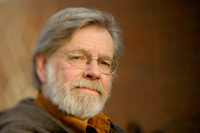by Rebekah Tilley
photos by Lee Thomas
With the election of President Barack Obama, who ran on a campaign platform promising to develop and deploy five coal-fired plants with clean carbon capture – clean coal technology has taken center stage. And in the Appalachian region, the “land where coal is king,” the potential impact goes well beyond the “simple” questions of a greener earth.
“Central Appalachia is deeply invested in coal and it’s deeply polarized over questions of jobs versus environment. How to sort out those questions cause real problems, especially in those areas of Appalachia that will have to live with the consequences,” said Dwight Billings, UK Professor of Sociology. “Coal has figured so centrally in the life of this particular part of Kentucky and West Virginia – in terms of employment, in terms of community development, jobs, labor, conflict, politics – that it’s just an inescapable factor in the life of mountain communities.”
 There are few better qualified than Billings to study the potential impact of clean coal in Appalachia. A West Virginia native, Billings grew up in the coal fields of Logan and Beckley and, as a college student during the “War on Poverty” in the 1960s, saw first hand the very real problems of economic hardship in Appalachia. He has devoted his academic career to the study of Appalachia from books like “The Road to Poverty: The Making of Wealth and Hardship in Appalachia” and numerous scholarly articles, to helping establish the Appalachian Center and the Appalachian Studies Program on campus.
There are few better qualified than Billings to study the potential impact of clean coal in Appalachia. A West Virginia native, Billings grew up in the coal fields of Logan and Beckley and, as a college student during the “War on Poverty” in the 1960s, saw first hand the very real problems of economic hardship in Appalachia. He has devoted his academic career to the study of Appalachia from books like “The Road to Poverty: The Making of Wealth and Hardship in Appalachia” and numerous scholarly articles, to helping establish the Appalachian Center and the Appalachian Studies Program on campus.
To advance this next chapter of Appalachian research, Billings and Jenrose Fitzgerald have recently been awarded a two-year grant from the National Science Foundation. Fitzgerald holds a PhD in Science and Technology Studies from Rensselaer Polytechnic Institute. This project will track the ways in which clean coal technologies are currently being institutionalized, supported, debated, and contested at the local level in Appalachia. Contemporary proposed coal-to-liquid production, coal gasification, and carbon capture and storage (CCS) projects in five Appalachian communities will be analyzed alongside coal gasification and related projects dating back to the 1970s in the region. The study will pay particular attention to how the key players in the policy surrounding clean coal – industry engineers and scientists, government scientists, university researchers, environmental activists, everyday citizens – make sense of the massive amount of information involved in the debate.
“There are three questions we can ask: What are the facts? Who can you trust? What do you do about it?” said Billings. “The natural scientist can tell us what is and is not possible, what’s technologically way down the road and what’s at hand, but they still can’t tell us what to do.”
Billings makes it clear that the study will not draw conclusions about the policy surrounding clean coal, but rather hopes to present a holistic set of questions that every policy maker and citizen should think about, ranging from the concerns of the local population, the energy needs of the country and the concerns for the well-being of the planet. Like any political contentious issue, the issue of trust is central. “There is a lot of polarization out there and there is a lot of mistrust,” said Billings.
 “You can hear very different sorts of things from the coal industry and environmental groups and it makes it hard to know who has the right information. Our point isn’t to come in like a technocrat with the right answers but to look at the problem and sort out where you can begin to find the answers so informed policy choices can be made.” Rather than giving a prescriptive policy about the “should” and the “oughts” of clean coal, the study hopes to clarify the questions that need to be addressed in public debate related to clean coal.
“You can hear very different sorts of things from the coal industry and environmental groups and it makes it hard to know who has the right information. Our point isn’t to come in like a technocrat with the right answers but to look at the problem and sort out where you can begin to find the answers so informed policy choices can be made.” Rather than giving a prescriptive policy about the “should” and the “oughts” of clean coal, the study hopes to clarify the questions that need to be addressed in public debate related to clean coal.
“We’re not trying to say we’re experts and we have the answers. But we are trying to say here are questions that need to be addressed, here are the differences of opinion that grow out of these various sectors, and these are the more reliable studies addressing this issue,” explained Billings.
By documenting and comparing the perspectives of a wide range of stakeholders, from government scientists to environmentalists to ordinary citizens, Billings and Fitzgerald hope to contribute in some way to the creation of a more meaningful public debate about clean coal technologies.
The two-year study is just beginning and Billings is uncertain at this stage what the ultimate products of the study will be. However, he and Fitzgerald are committed to publishing their findings in formats that are accessible to the range of players involved in debates over alternative energy technologies. In addition to scholarly articles, one potential item may be a type of citizen’s guild to clean coal.
